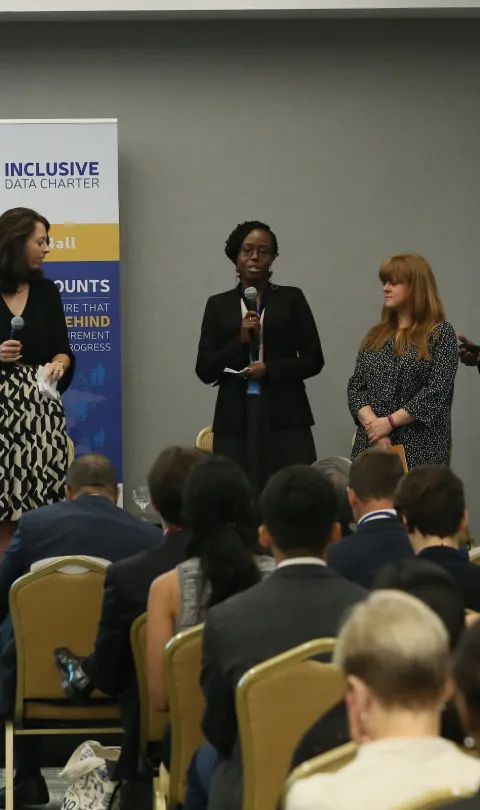NEW YORK, JULY 17, 2018
At a launch event today in New York, governments, international organizations, and non-governmental organizations committed to a disaggregated data agenda that seeks to ensure data used in policymaking are inclusive of everyone, including marginalized groups and the extreme poor.
The Inclusive Data Charter is a commitment to ensure that no one is left behind in the pursuit and measurement of social and economic progress. Its five principles provide a framework for signatories to implement within their own work.
It is inspired by the 2030 Agenda for Sustainable Development’s universal mandate to “leave no one behind.” The Global Partnership for Sustainable Development Data is the charter’s facilitator, and developed the charter together with 10 partners, who are now the “founding champions.” Each champion is required to produce an “Action Plan” for implementing the vision and principles of the charter.
The Inclusive Data Charter Launch event, held during the UN High-Level Political Forum, featured keynote remarks from H.E. Professor George Gyan-Baffour, the Minister of Planning in Ghana.
Ghana, one of the founding champions of the charter, is putting into place new policies and regulations that will help make data more inclusive and comprehensive while maintaining quality.
“Ghana’s Inclusive Data Charter Action Plan will spur action to help all its citizens be counted and access public services. For example, we’re strengthening our administrative data systems, which will give Ghana more granular, timely data and thus transform our ability to monitor the SDGs while ensuring we’re reaching those who need it most,” said H.E. Professor George Gyan-Baffour.
Colombia’s National Administrative Department of Statitiscs (DANE), The Philippines Statistics Authority, the UK’s Office for Nationals Statistics, Data2X, Development Initiatives, HelpAge, Sightsavers, UNICEF, and UNFPA are the other founding champions of the charter.
You can read each champions’ Action Plan in brief here, or find full versions here.
Learn more about the Inclusive Data Charter here: bit.ly/IDCdata4all
ABOUT THE INCLUSIVE DATA CHARTER
The 2030 Agenda for Sustainable Development commits to leaving no one behind. In order to fulfill this pledge, we need more granular data to understand the needs and experiences of the most marginalized in society, and we must ensure that resources are being allocated to maximize outcomes for the poorest. Currently, too little data is routinely disaggregated.
While there are many technical and methodological challenges inherent in improving data disaggregation, some of the largest barriers are political and financial. The Inclusive Data Charter (IDC) was developed by a task team, comprised of the Global Partnership for Sustainable Development Data and partners, to mobilize political commitments and meaningful actions to deepen disaggregation. The IDC is a multi-stakeholder mechanism with a core group of governments, international organizations, and civil society organizations that will sign on as the first champions.
ABOUT THE GLOBAL PARTNERSHIP FOR SUSTAINABLE DEVELOPMENT DATA
The Global Partnership for Sustainable Development Data is a growing network of more than 300 organizations, including governments, businesses, and civil society organizations, working around the world to harness the data revolution for sustainable development. Since it was created in 2015, the Global Partnership has elevated data issues at a political level, launched a multi-million-dollar Collaborative Data Innovations for Sustainable Development funding initiative, and supported the advancement of country-led Data Roadmaps for Sustainable Development in: Colombia, Ghana, Kenya, Philippines, Senegal, Sierra Leone, Tanzania, and Costa Rica.
CONTACT INFO
Amber Kiwan
Communications Officer
Global Partnership for Sustainable Development Data
akiwan(at)data4sdgs.org
